Girls: The Complete First Season Blu-ray Movie
HomeGirls: The Complete First Season Blu-ray Movie 
Blu-ray + DVD + UV Digital CopyHBO | 2012 | 300 min | Rated TV-MA | Dec 11, 2012
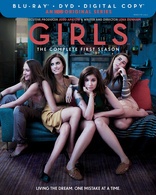
Movie rating
6.4 | / 10 |
Blu-ray rating
| Users | 4.8 | |
| Reviewer | 4.5 | |
| Overall | 4.6 |
Overview
Girls: The Complete First Season (2012)
Four 20-something women in New York try to figure out what they want - from life, from men, from themselves and each other. The answers aren't always clear or easy, but the search is profoundly relatable and infinitely amusing.
Starring: Lena Dunham, Allison Williams, Jemima Kirke, Zosia Mamet, Adam DriverDirector: Lena Dunham, Jesse Peretz, Richard Shepard, Jamie Babbit, Jody Lee Lipes
| Comedy | 100% |
Specifications
Video
Video codec: MPEG-4 AVC
Video resolution: 1080p
Aspect ratio: 1.78:1
Original aspect ratio: 1.78:1
Audio
English: DTS-HD Master Audio 5.1
French: DTS 5.1
Spanish: DTS 2.0
Subtitles
English SDH, French, Spanish, Danish, Finnish, Norwegian, Swedish
Discs
50GB Blu-ray Disc
Three-disc set (2 BDs, 1 DVD)
UV digital copy
DVD copy
Playback
Region A, B (C untested)
Review
Rating summary
| Movie | 4.5 | |
| Video | 4.5 | |
| Audio | 4.5 | |
| Extras | 4.5 | |
| Overall | 4.5 |
Girls: The Complete First Season Blu-ray Movie Review
No More Waiting for the Girls Upstairs; They're Already Here
Reviewed by Michael Reuben December 12, 2012Lena Dunham's Girls was more than just a succès de scandale—isn't that phrase so Jessa?—but there's no denying that the HBO series benefitted from the polarizing reactions that greeted it during its initial broadcast earlier this year. People who liked it really liked it. People who hated it did so with venom. In the hyper-competitive world of cable and streaming media, anything that garners a strong reaction has an advantage. I missed Girls during its initial broadcast from April 15-June 17, 2012, but having now watched all ten episodes of the first season back to back, I'm thrilled with what Dunham and co-producer Judd Apatow have accomplished. (Contrary to what some have claimed, Apatow did more than just bankroll Girls. As the extras on this Blu-ray set make clear, he was a critical part of the creative process.) Fulfilling the promise of her precocious debut feature, Tiny Furniture, Dunham has created a nuanced portrait of a pivotal moment both in history and in a young person's life, when possibilities seem simultaneously grand and curtailed. Years from now, when cultural historians look for a portrait of America during the Great Recession, Girls will be essential source material. As the title of the series indicates, the world in Girls is seen through female eyes. Despite the inevitable comparisons to Sex and the City that prompted Dunham to write a lengthy riff on HBO's previous girl-power smash into her pilot episode as a kind of inoculation, Girls couldn't be more different. (One might as well say Entourage and Californication are the same show.) Carrie Bradshaw and her friends were in their thirties, had established careers and knew who they were. The ladies of Girls are in their twenties, are just starting out and can't decide who they want to be. There's a special quality to the terror of waking up in the morning and having no bearings in life that you only appreciate later when the sensation is gone. That's why the older doctor examining Dunham's character, Hannah, in episode 2 says, "You could not pay me enough to be twenty-four again." Hannah's answer is typical of the mordant wit that sneaks up at odd moments in Dunham's writing: "Well, they're not paying me at all."
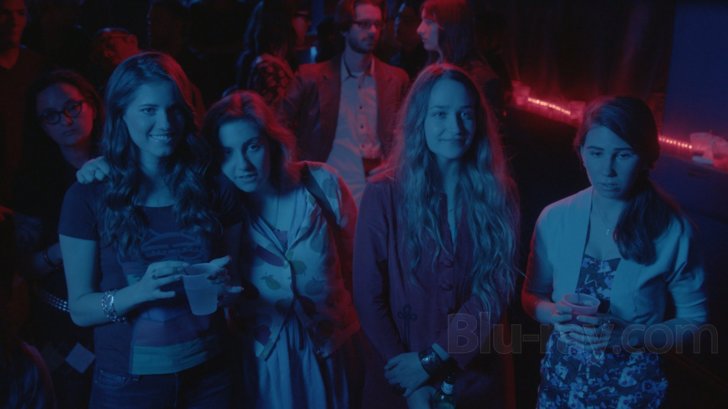
It was Apatow who invented the motivating device that launches the season. In the pilot's opening scene, Hannah's parents, Tad and Loreen Horvath (Peter Scolari and Becky Ann Baker, perfect with each other and with Dunham), cut off her financial support and send her into a tailspin. She's still spinning at the end of episode 10, but by then she's left her unpaid internship at a literary magazine, tried and quit a variety of menial jobs and run up enormous debt to her roommate and best friend, Marnie Michaels (Allison Williams), the Felix to Hannah's Oscar. (I can't claim credit for the comparison; it's Apatow's.) Although Hannah identifies herself to everyone as "a writer"—notably during episode 6, where she returns home to Michigan to visit her parents—very little writing occurs during the months covered by season 1. When she's invited to give a reading of her work by a former professor (The Sopranos' Michael Imperioli, looking credibly distinguished), Hannah ends up dashing off something spontaneous on the subway, because what she'd planned to read feels stale and contrived. The new work isn't well-received, because it is, after all, just a rough draft. What Hannah does relentlessly with her time is scrutinize herself, whether directly or reflected through the eyes of the elusive and twisted sexual partner, Adam Driver (Adam Sackler), whose feelings about her (if he has any) she simply cannot "read". Such inner focus will strike many viewers as self-indulgent and narcissistic—because it is. Hannah belongs to a distinguished line of comic personas, many of them familiar from stand-up, whose running commentary vacillates between self-regard and self-loathing. They are their own best material in comedy and their own worst enemies in life. It's not as if Hannah is alone in her self-absorption. The same phenomenon is evident among all her friends, their love interests and a few older cases of arrested development who appear along the way. Roommate and best friend Marnie is superficially gorgeous, always together and appears ideally suited for the PR world in which she works as an assistant. Just beneath the surface, however, Marnie is as confused as Hannah. She compensates by trying to control the world around her, organizing everything in sight, whether it's her own emotions or doctor's appointments for her friends. Marnie is still with her college boyfriend, Charlie (Christopher Abbott), because she thinks it's the right thing to do, even though she finds his touch revolting. The consequences of that decision enforced by sheer will power play themselves out through the entire season. Their British friend Jessa Johansson (Jemima Kirke), newly returned from abroad, is at the opposite end of the spectrum. Where Marnie tries to control life, Jessa wafts through it, letting it wash over her, treating the entire world as a giant multimedia center created for her entertainment. A sensual and sexual omnivore ("I'm attracted to almost everyone I meet", she says, "but it only lasts for a few minutes"), Jessa traipses through much of the season as a law unto herself, until near the end when she's brought up short by an unexpected confrontation with someone older who used to be like her. (I don't want to specify whom.) Jemima Kirke provides a revealing glimpse into the inner life of a certain type of seductress who will be familiar to many men. Jessa is the female version of Hannah’s inscrutable boyfriend, Adam. Her unusual arc is a series highlight. The fourth "girl" of the title is Jessa's cousin, an NYU student named Shoshanna Shapiro (Zosia Mamet, daughter of David and actress Lindsay Crouse). Shoshanna was originally intended to appear only in the pilot, but Dunham says that everyone decided to make her a regular after seeing what Mamet made of the character. Shoshanna talks so fast and with such intensity that she seems to invest every word with momentous consequence. At times, you want to reach out a hand to reassure her that everything will be all right. In a series that is already a comedy, Mamet manages to make Shoshanna the comic relief. Her accidental encounter with crack in episode 7 results in a riotous physical bit that defies description. You just have to see it. Although Hannah's, and to a lesser extent, Jessa's, efforts to earn a living are a recurring issue, work generally takes a back seat to private life in season 1 of Girls. Monogamy, pregnancy, STDs, abortion and a variety of sexual hang-ups are all addressed with a level of candor that some viewers may find disturbing. For all the sex and nudity that occurs in Girls, almost none of it is pretty or erotic. As a writer, Dunham is more interested in what occurs emotionally between the inner worlds of the people whose bodies are struggling to connect than in how their flesh appears on screen. The physical proceedings are frequently awkward and embarrassing and the results less than satisfying, which is why they're alive with comic potential. The interior is where you find drama and, if you're lucky, truth.
Girls: The Complete First Season Blu-ray Movie, Video Quality 
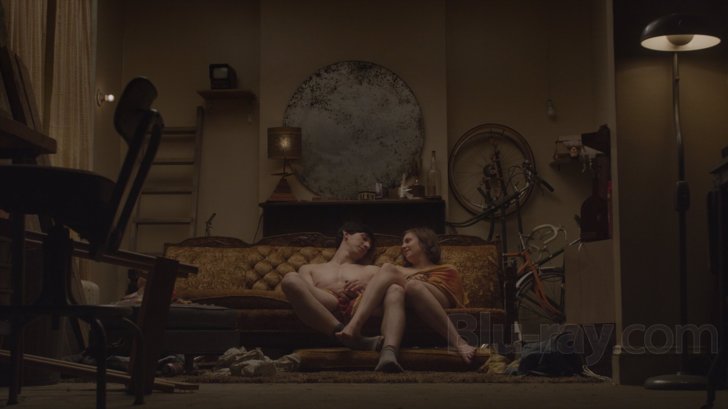
Girls is shot digitally; IMDb says that the show uses the Arri Alexa camera, but for present purposes that's a detail. The show has the smooth, detailed look that distinguishes digital capture, and it's well-reproduced on HBO's 1080p, AVC-encoded Blu-ray presentation. The color palette tends toward the muted and subdued, except in specific environments where bold visual statements are called for, e.g., a party thrown by Marnie's PR boss or specific aspects of the wild Bushwick party in episode 7. Black levels and contrast are excellent, although one gets the sense on occasion that the digital colorist may have performed some discreet airbrushing here and there in some of the nude scenes (or perhaps it was the DP doing tricks with light). Having not watched the original broadcasts, I am not in a position to compare the Blu-ray. Then again, since I have Time Warner Cable in Manhattan, there's no doubt that the Blu-ray image beats any broadcast I might have received.
Girls: The Complete First Season Blu-ray Movie, Audio Quality 
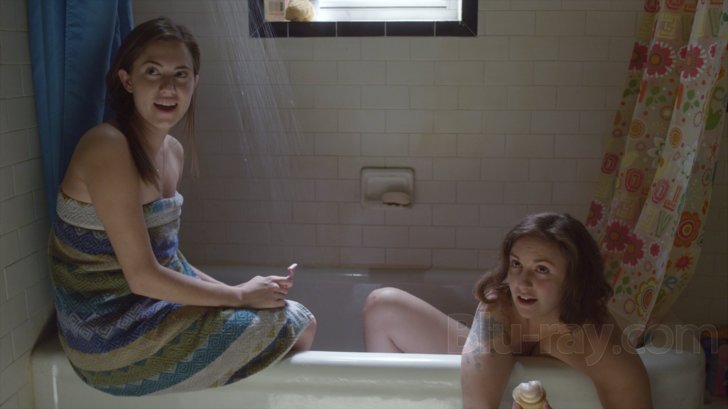
The lossless DTS-HD MA 5.1 delivers a nice sense of ambiance, especially in distinctive environments such as restaurants and the Brooklyn neighborhood street scenes. In venues with more enveloping sound, like the Bushwick party or the Oberlin College event seen in flashback, the surround presence is more aggressive and immersive. Girls doesn't have many occasions for discrete rear effects or obvious pans, although there's a traffic scene (I can't be more specific) where sound is a critical element. The dialogue, which is one of two essential components to Girls' soundtrack, is always clear. The other essential component is the musical selections. The underscoring has been composed by Michael Penn. It's sparingly used, beautifully integrated and sounds great. Songs by other artists are used over the end titles (in the style of Mad Men and The Sopranos) and at key points in the episodes. They've been mixed slightly louder than is typically the case and resonate through the entire speaker array. Maybe I'm overinterpreting, but it's as if the sound mixers wanted to simulate the effect of hearing these songs through ear buds on an iPod. Whatever the intent, the bass extension is deep and the sense of immersion is powerful. A playlist can be found here.
Girls: The Complete First Season Blu-ray Movie, Special Features and Extras 
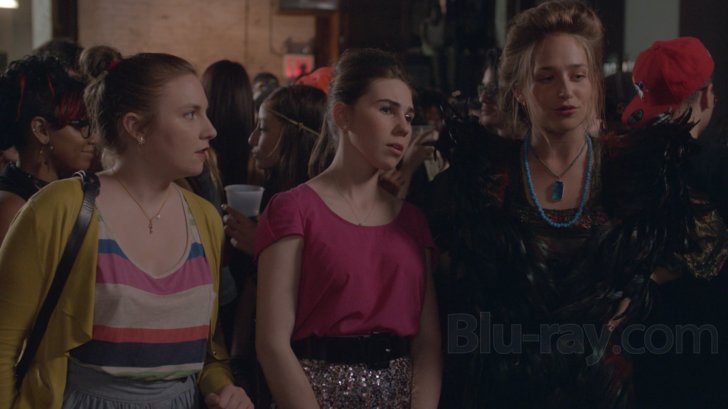
- Commentaries
- Episode 1, with Lena Dunham and Executive Producer Jenni Konner.
- Episode 6, with Lena Dunham and Judd Apatow.
- Episode 7, with Lena Dunham and Jenni Konner.
- Episode 9, with Lena Dunham and Director Richard Shepard.
- Episode 10, with Lena Dunham, Allison Williams, Jemima Kirk and Zosia Mamet.
- A Conversation with the Girls (disc 1) (1080p; 1.78:1; 21:37): The four stars of Girls discuss the series, their characters and rejected title concepts.
- Deleted and Extended Scenes: Almost any of them could have been included. Time limitations were the likely reason for cutting them.
- Disc 1 (1080p; 1.78:1; 17:02)
- Disc 2 (1080p; 1.78:1; 11:40)
- Cast Auditions (disc 1): Especially with the two men, you can tell the audition is working from all the laughter off-camera.
- Adam Driver (Adam) (1080i; 1.33:1; 6:51)
- Allison Williams (Marnie) (1080i; 1.33:1; 2:21)
- Andrew Rannells (Elijah) (1080i; 1.33:1; 6:27)
- Zosia Mamet (Shoshanna) (1080i; 1.33:1; 2:59)
- Table Reads: The most notable discovery in watching the table reads is how much changes between the initial full-cast read-through of what is supposed to be a finished script and the final product as broadcast.
- Disc 1 (1080p; 1.78:1; 19:31): Excerpts from episodes 2, 3, 4, 5.
- Disc 2 (1080p; 1.78:1; 10:48): Excerpts from epsidoes 7, 8, 10 (alternative ending).
- Inside the Episodes: Each episode is accompanied by a brief interview with Dunham discussing its place in the overall arc of the season. These featurettes can be accessed from the "Features" menu of each disc, which includes a "play all" function, or individually from the episode menus.
- Disc 1 (1080i; 1.78:1; 13:48)
- Disc 2 (1080i; 1.78:1; 14:55)
- A Conversation with Lena Dunham and Judd Apatow (disc 2) (1080p; 1.78:1; 24:40): "Comedy is best", says Apatow, "when it's about humiliation." From this conversation, it's clear that Apatow helped push Dunham to new heights (or depths) in her writing, especially as concerns the depiction of the men in the series. Apatow also staged an "intervention" after HBO picked up the pilot to prevent Hannah's hair and makeup from being too much improved, which would have been wholly wrong for the character. (When she appears as herself, Dunham always looks more "put together" than Hannah.)
- The Making of Girls (disc 2) (1080p; 1.78:1; 16:05): Behind-the-scenes on several episodes, including rehearsal and location footage. The single best moment is an elaborate prank played on Dunham by the cast and crew during the filming of episode 5.
- Gag Reel (disc 2) (1080p; 1.78:1)
- Part 1 (5:22)
- Part 2 (5:32)
- Fresh Air Interview with Lena Dunham (disc 2) (audio only; 36:55): Fresh Air is a show on NPR hosted by Terry Gross. This detailed discussion from May 2012, while the first season of Girls was still airing, ranges broadly over both the show and Dunham's life to date. The interview was noted at the time for Dunham's response to specific criticisms of the show.
- Girls @lenadunham Twitter Journal: An illustrated selection of Dunham's tweets chronicling the production of the first season.
Girls: The Complete First Season Blu-ray Movie, Overall Score and Recommendation 

It's ironic to read complaints about the characters in Girls being "trite, whiney and boring" (an actual quote), given how often the characters in Girls accuse each other of that very behavior. It's even more ironic to read such comments on the internet, where, more often than not, the writer is engaging in a discussion with its share of trite, whiney and boring commentary on a subject (i.e., a TV program) of less than earth-shattering importance. (And, as a reviewer, I'm fully aware of the paradox.) Much of the humor in Girls perches on a razor's edge of discomfort and self-parody, where young characters seeking meaning in their lives grossly overestimate their relevance to the world, which prompts them to speak of ordinary matters in grandiose terms. Meanwhile, events puncture their balloons of self-importance, even as they speak. One such typical moment occurs in the series pilot, when Hannah bursts into her parents' hotel room to declare, "I think I may be the voice of my generation". One internet poster clucked: "[S]ettle down Dunham, not everyone is an overprivileged 20something living in New York. That's not my generation." But it was Hannah's line, not Dunham's. As a writer, director and actor, Dunham has the line delivered by someone other than her—someone who's high on opium tea, babbling uncontrollably and passes out shortly after, but not before backing off the claim ("or at least a voice of a generation"), shoving a noticeably thin sheaf of pages into her parents' hands (representing her entire literary output to date) and demanding financial support for two more years. In other words, Dunham followed Apatow's rule that the best comedy is about humiliation by writing a truly humiliating scene for Hannah, then performing and directing it. You're supposed to laugh at Hannah's follies, and those of her friends, but still like them enough to enjoy watching them fumble. If you can savor that kind of collision of sensations in entertainment, Girls is some of the most compelling TV out there. Highly recommended.
Other editions
Girls: Other Seasons

Girls: The Complete First Season
Bonus Disc
2012

Girls: The Complete Second Season
2013

Girls: The Complete Second Season
2013

Girls: The Complete Third Season
2014

Girls: The Complete Fourth Season
2015

Girls: The Complete Fifth Season
2016

Girls: The Final Season
2017
Similar titles
Similar titles you might also like

Mamma Mia! Here We Go Again
Sing-Along Edition
2018

How to Be Single
2016

Obvious Child
2014

Lola Versus
2012

Isn't It Romantic
2019

The Sisterhood of the Traveling Pants 2
2008

Sex and the City: The Movie
Extended Cut
2008

The Rebound
2009

It's Complicated
2009

A Case of You
2013

Fools Rush In
1997

What Happens in Vegas
2008

That Awkward Moment
2014

Crazy Rich Asians
2018

Hitch
2005

Friends with Kids
2011

Jack Goes Boating
2010

Fading Gigolo
2013

Solitary Man
2009

Some Kind of Beautiful
2015